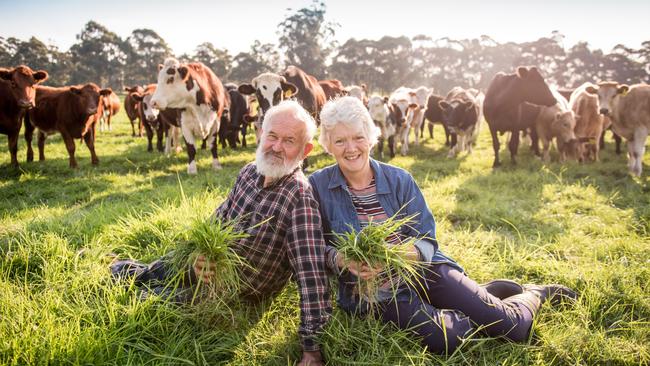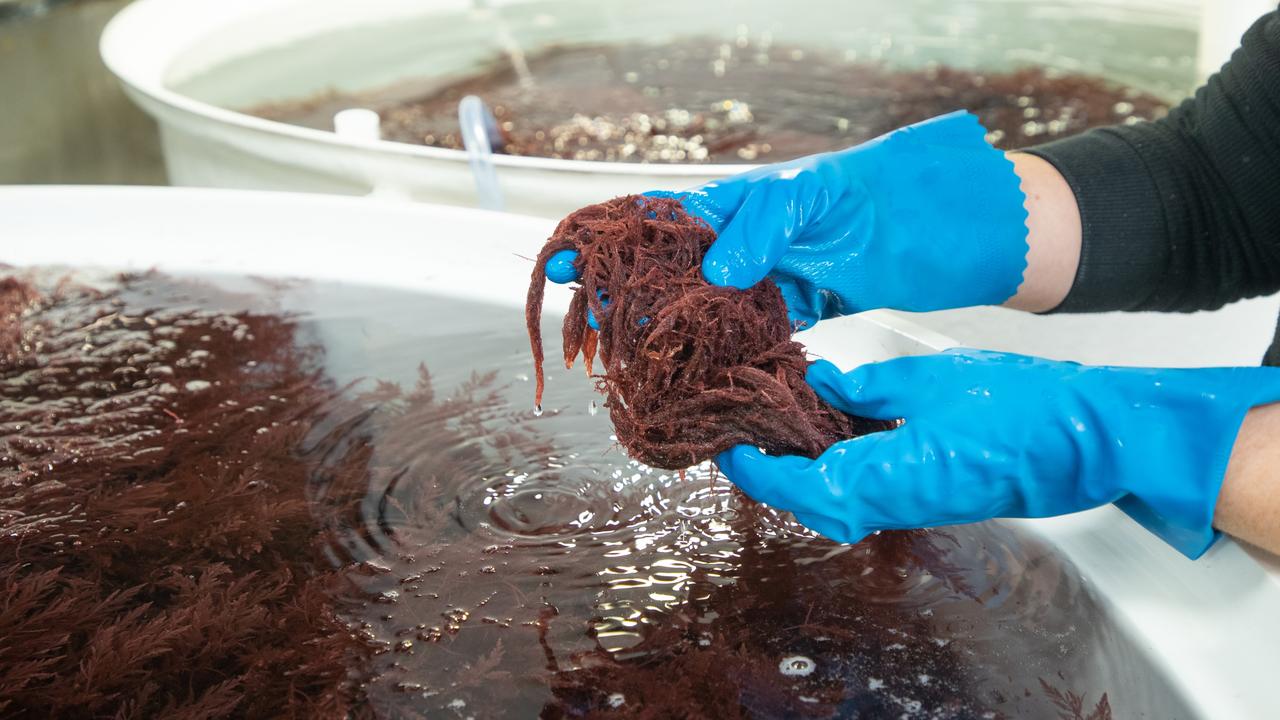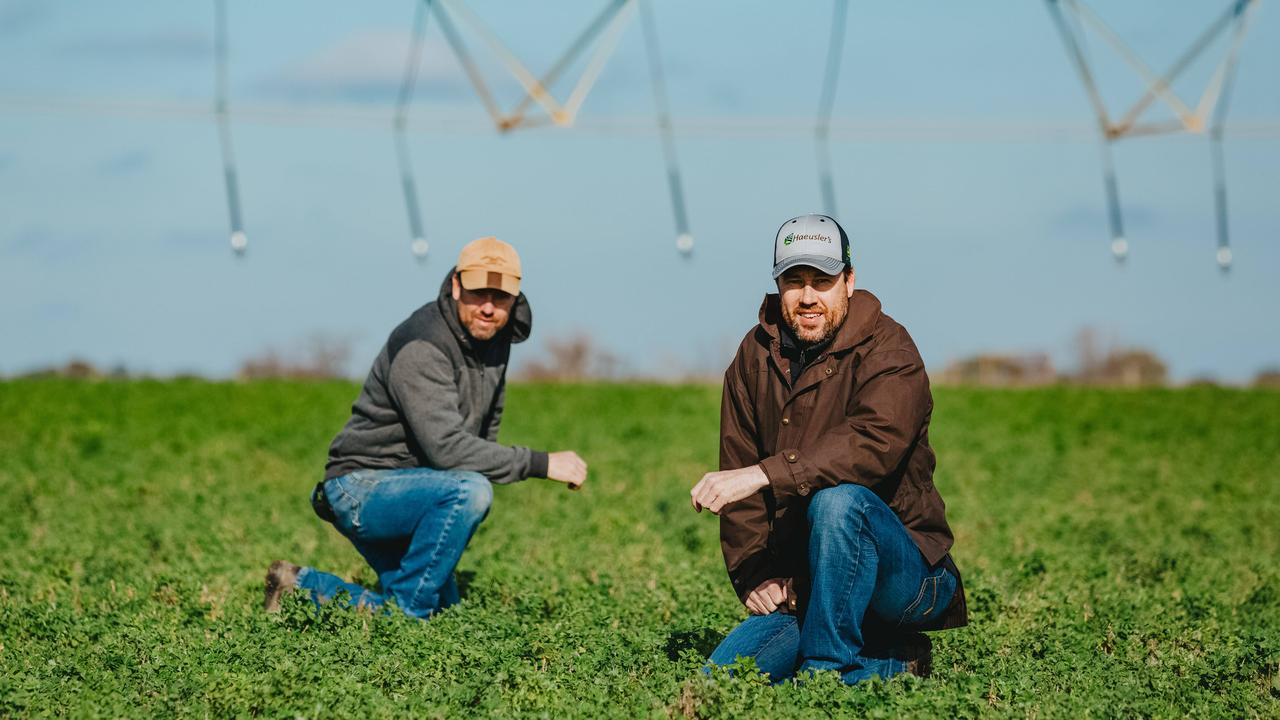The grass is greener for the Trevaskis
ROSANNE and Ian Trevaskis’ pasture has been invigorated since the family stopped using artificial fertilisers.

PRODUCTION is the mantra of the meat industry. Maximise production and you maximise the dollar.
But Rosanne and Ian Trevaskis see this mantra as topsy-turvy.
The couple, who farm 120 hectares near Orbost in East Gippsland with one of their five daughters, Jo, focus instead on producing “gourmet” beef.
“Our priority is not production but the micro-organisms of the soil,” Rosanne says. “The important thing is not quantity but quality.”
Rosanne says because they don’t use artificial hormones, chemicals or fertilisers, and because they value-add, they have better returns on the product and can reduce stocking rates.
The Trevaskis family stock up to 70 Belgian Blue-cross cattle, alongside 30 Wiltshire Horn sheep, selling under their Beef@theFarmGate boxed brand.
For the past seven years, their farming philosophy has been around regenerative agriculture — an approach centred on building soil health and regenerating unhealthy soil — adopted after years of farming and drought left the land “sad”.
When the Trevaskises heard a talk by regenerative farming advocate Christine Jones, they stopped using soluble, artificial fertilisers, especially superphosphate and urea.
They now focus on rotational grazing, not allowing livestock to eat pasture down to the ground, and have a “Sabbath paddock”, each year resting one paddock for up to 12 months.
They have stopped making hay, instead allowing stock to trample grasses into the soil to promote natural fertility.
“You can just see the differences when you look at the land,” says Rosanne, who was the inaugural president of the local Wairewa and District Landcare group for seven years.
“We can’t prove it, but since we have followed regenerative agriculture we don’t have sick animals. We have not called a vet for a long time. We used to have a few dead cows and calves at calving, but once we stopped using super we had less calving problems.”

Rosanne says their current method of farming came after years of working to improve the farm.
The original 75-hectare farm (they later bought more property) was settled by Ian’s grandfather in 1908 and was run by his father as a dairy.
Ian and Scottish-born Rosanne met in Papua New Guinea and were married in Rosanne’s native UK in 1979. They returned to Australia two years later, and Ian started his own business in fencing and ground maintenance while also helping his parents, Archie and Ettie, on the farm.
In 1989, the couple took over running the farm and opted out of dairy for the lifestyle, “not working every day, twice a day”.
Initially they built up the herd with a few cross-bred dairy heifers and a Belgian Blue bull chosen for its favourable traits including temperament and double-muscling, which produces larger volumes of meat and reduced deposits of fat.
Rosanne says the Belgian Blues’ double-muscling is also linked to reproductive problems, which the family overcame initially by crossing them with the cross-bred dairy heifers, and more recently by using a Belgian Blue-Angus-cross bull.
Since moving to the property, the couple have tried various approaches. They participated in Meat and Livestock Australia’s BeefCheque education program, which introduced them to rotational grazing, and learned about Environmental Management Systems through a local meat co-op, where they tackled problems of erosion and water quality.
But, they say it is regenerative agriculture that has won them over.
The herd is joined twice a year for calving in late May-June and December-January.
Calves are grown out to 10-13 months, or 360kg, with about 35 cattle processed a year.

To reduce stress on cattle, Ian and Rosanne load animals into trucks at 4am and send them for immediate processing at abattoirs at either Orbost or Sale. Meat is sent to butchers at Orbost or Bairnsdale and hung for 10 days, then packed into seven product options.
In 2004 they created value-added business Beef@theFarmGate, after receiving poor prices at saleyards.
They now have a database of about 350 customers, mainly in Gippsland and Melbourne, and sell via delivery or pick-up 10 months of the year. They also sell at four farmers’ markets throughout Gippsland, and are looking to extend to Melbourne markets. Cattle not making the grade are sold through saleyards.
Two years ago, following customer requests, the Trevaskis family established a flock of Wiltshire Horn sheep, choosing the breed because it sheds its wool, eliminating the need to shear, and because cross-grazing with cattle cuts down the spread of intestinal parasites.
Last year they processed 19 sheep, with lambs grown out to 9-12 months. They also obliged some customers’ requests for hogget, which is lamb more than 16 months old.
Lambs are sold in half and whole packs.
Rosanne says “the buzz” of farming for her is about maintaining their vision of farming from the soil to the plate.
“It’s not just the health of the land or the animals,” she says, “but human health that’s important to us.
“We can’t help but think natural, uncontaminated, unpolluted grazing, with humane slaughtering, is the way to go.”
FARM FACTS— Beef@theFarmGate

Rosanne and Ian Trevaskis farm 120 hectares near Orbost in East Gippsland with their daughter, Jo.
They stock up to 70 Belgian Blue-cross breeders, alongside 30 Wiltshire Horn sheep, selling under their Beef@theFarmGate boxed brand, as well as at farmers’ markets.
Their farming philosophy for the past seven years has been around regenerative agriculture, avoiding soluble, artificial fertilisers, adopting rotational grazing and not cutting hay.



